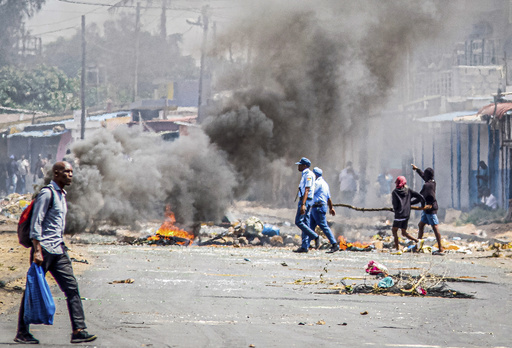
JOHANNESBURG — Mozambique has recently been engulfed in protests following the controversial results of the elections held on October 9, where the ruling party Frelimo’s candidate, Daniel Chapo, was announced as the victor.
Reports indicate that at least 30 individuals lost their lives amid the unrest that erupted in the wake of these disputed electoral results. The ongoing violence is expected to take center stage during the upcoming Southern African Development Community (SADC) summit.
Venancio Mondlane, the independent candidate who secured the second position with 20% of the votes, is contesting the electoral outcomes and is advocating for nationwide protests to express dissent.
The post-election violence raises significant concerns for the region due to various reasons.
Firstly, while some Southern African nations are known for conducting free and fair elections, Mozambique’s recent experiences paint a different picture. For instance, South Africa and Botswana held elections this year that were largely viewed as credible.
In Botswana, a ruling party that had been in power for nearly six decades was ousted seamlessly, and South Africa witnessed the ruling party losing its parliamentary majority for the first time since 1994, leading to the formation of a coalition government with opposition groups. Recent elections in Mauritius also resulted in a decisive victory for the opposition. Namibia is preparing for its elections later this month.
Despite these instances of democratic progress in the region, Mozambique’s electoral disputes are troubling. The European Union’s observation team has reported irregularities during the October elections, including alterations to results. Previous local elections in 2023 also saw the Frelimo party accused of manipulating votes, a claim that officials have repeatedly denied. Zimbabwe continues to grapple with a history of contested electoral processes, with the 2023 elections there criticized for significant irregularities and a lack of adherence to constitutional standards.
Beyond political ramifications, Mozambique’s instability could impact regional trade and the economy. The nation plays a pivotal role in Southern Africa’s trade, sharing borders with several countries, including South Africa, Tanzania, Malawi, Zambia, Zimbabwe, and Eswatini.
Instability in Mozambique often spills over to its neighbors, many of which already face hurdles related to illegal migration. Following the recent protests, South Africa has closed its Lebombo border with Mozambique, impacting trade routes. South Africa utilizes the Maputo harbor in Mozambique for exporting certain goods, and the border shutdown has left trucks carrying minerals stranded. Industry experts estimate that South Africa’s economy incurred losses of R10 million (approximately $555,177) daily due to the closure. Notably, in 2023, over half of South Africa’s chrome ore and concentrate exports were routed through the Maputo harbor.
Mozambique is rich in mineral resources, and the discovery of natural gas in 2010 has the potential to revitalize its economy and enhance collaboration with neighboring countries in the energy sector.
Another layer of concern is political stability, as Mozambique still bears the scars of a violent civil war that lasted 15 years, pitting the leftist Frelimo party against the Renamo rebel group post-independence. The first elections in 1994 marked a significant turn, as it was the first event devoid of armed groups affiliated with political entities, following a disarmament initiative. However, since 2017, the nation has been battling an insurgent group linked to the Islamic State, which has launched attacks on communities, particularly in the northern Cabo Delgado province.
Currently, approximately 600,000 of the 1.3 million displaced individuals have begun to return to their homes, which are largely devastated, with infrastructure such as houses, markets, schools, and hospitals in ruins, according to information provided by the United Nations earlier this year.
With many Mozambicans residing in neighboring countries seeking better work opportunities, any further upheaval in Mozambique could lead to increased migration and further strain the social dynamics in the region.
